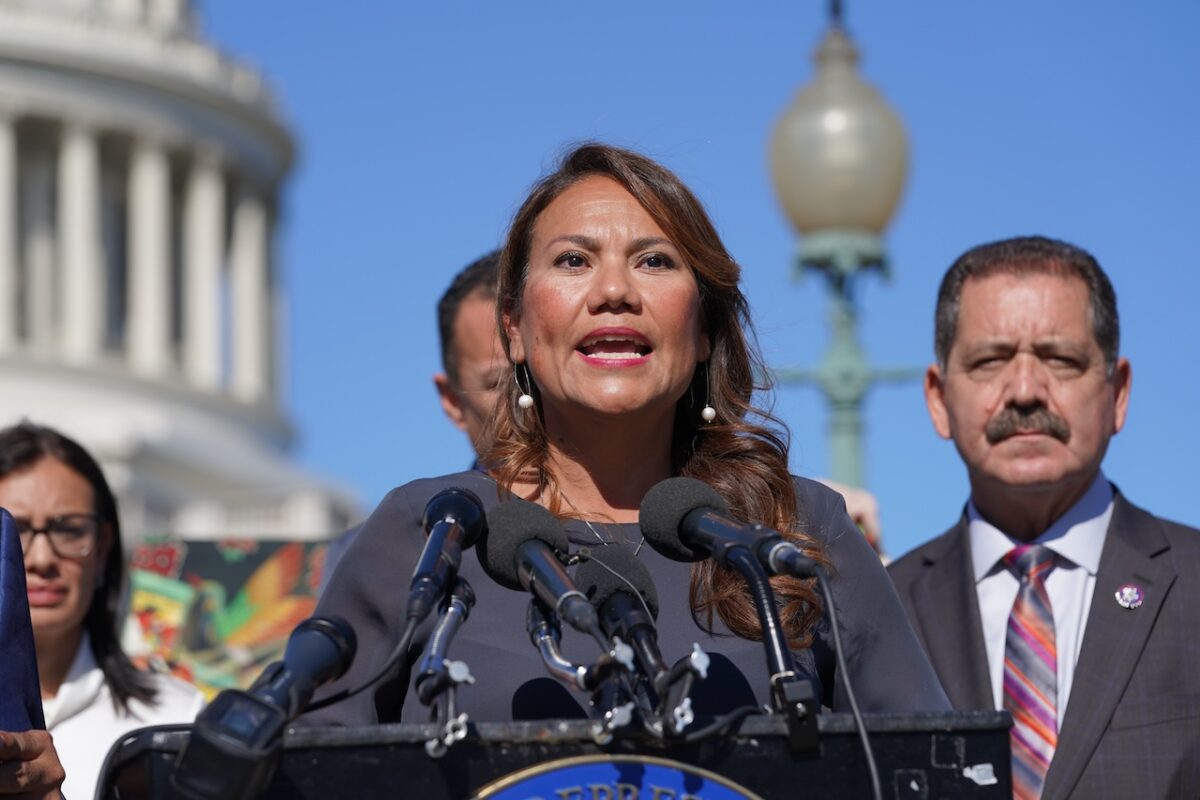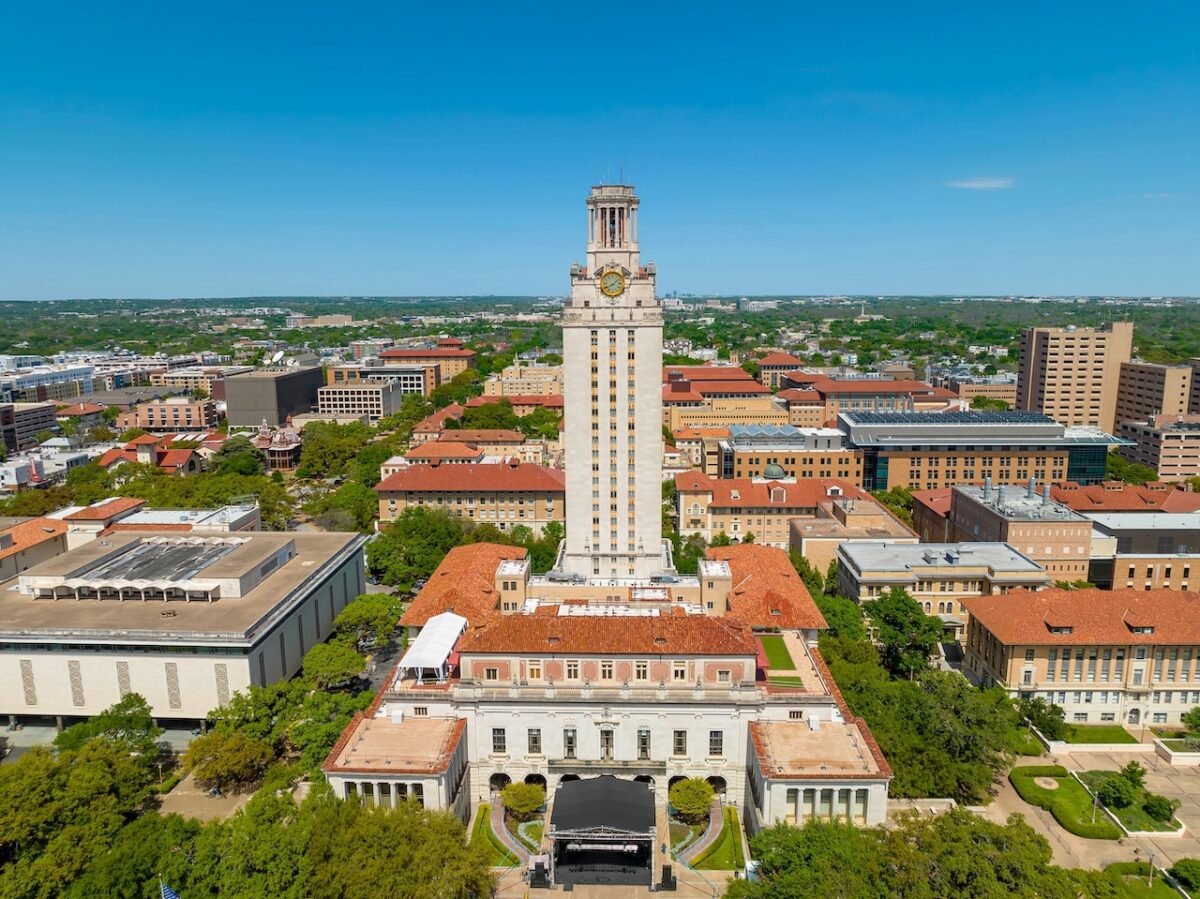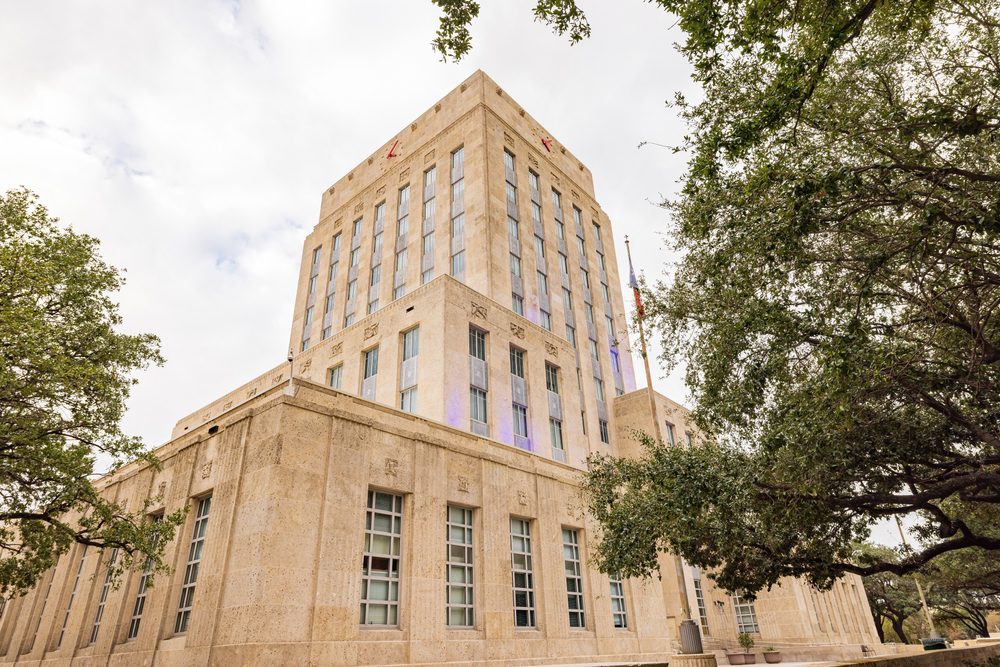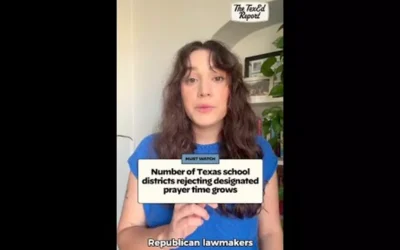
Students at UT protested Trump's compact on Oct. 13. (Photo by Aaron E. Martinez/Getty Images)
The Trump administration offered preferential funding to nine colleges that agreed to pledge loyalty to his conservative agenda. The University of Texas has yet to publicly respond to the offer.
In early October, the White House sent letters to nine public and private universities—including the University of Texas at Austin—urging their leaders to sign a “compact” pledging support for President Trump’s political agenda to ensure preferential access to federal research funds.
Universities had until Monday to respond, but UT was the only school that didn’t say publicly what it decided to do
Seven university systems—including the Massachusetts Institute of Technology, Brown University, the University of Pennsylvania, the University of Southern California, Dartmouth College, the University of Virginia, and the University of Arizona—rejected the proposal outright. Vanderbilt didn’t reject or accept the proposal. The school stated it was only “asked to provide feedback and comments as part of an ongoing dialogue.”
While UT remained silent, Kevin Eltife, chair of the UT System Board of Regents, said earlier this month that UT was honored to receive Trump’s letter and looked forward to reviewing the compact.
Critics of Trump’s push for universities to comply called the move “patently unconstitutional.”
“ This compact is not surprising, but incredibly worrisome,” Caro Achar, engagement coordinator for free speech at the ACLU of Texas, told COURIER Texas. “It’s an incredibly egregious version of what we have already seen, which is an attempt over and over again here in the state of Texas—and all over the country—to censor viewpoints that the government disagrees with, which is patently unconstitutional.”
Higher education in Texas has recently faced a slew of attacks from Republicans. A Texas A&M professor was fired for discussing gender identity in class. Then, Texas A&M president Mark Welsh resigned after receiving criticism from Republican lawmakers for not moving quickly enough to fire the professor. A Texas State professor was also fired for talking at an online socialist conference, and five campuses in the Texas Tech University system have banned all faculty from discussing gender identity in the classroom.
Several other campuses across the state are ordering a full audit of their curriculum to ensure it’s taught in a “value-neutral” manner.
And most recently, a UT professor was dismissed from his administrative role because of “ideological differences.”
Trump’s “Compact for Academic Excellence in Higher Education” expands on what has been seen in Texas, asking universities to:
- Ban the consideration of race or sex in the hiring and admissions processes.
- Freeze tuition for a five-year period.
- Post the earnings of students who graduated with certain majors.
- Adopt a stricter definition of gender.
- Bar transgender people from using restrooms or playing sports that align with their gender identity.
- Limit international undergraduate enrollment to 15% of the student population.
- Require applicants to take standardized tests, such as the SAT or ACT.
- Restrict employees from expressing political views on behalf of the institution.
- Shut down departments that “punish, belittle” or “spark violence against conservative ideas.”
- Anonymously poll students and employees on compact compliance and publish the results.
The Justice Department would enforce the terms of the agreement, and colleges that sign but are found to violate the compact could face significant fines, according to the 10-page proposal.
“This compact imposes requirements that create and entrench policies that artificially depress the admission rates of Black people and other students of color. It’s a very egregious attack on what remains of affirmative action,” Achar said. “It also explicitly censors professors, programs, and courses that espouse viewpoints with which the administration disagrees.”
Achar added that the compact is an effort to erase trans students and push them out of state schools, while also making it less safe for international students, too.
Education advocates called the agreement a threat, and both students and faculty at UT have protested against it.
On Oct. 15, the ACLU of Texas and other advocacy organizations sent a letter to the nine universities and urged them to reject the proposal. A recent statement signed by dozens of higher education associations said they were “deeply concerned that the compact’s prescriptions threaten to undermine the very qualities that make our system exceptional,” and a group of scientists have also voiced their opposition.
Achar echoed these sentiments
“ It very explicitly wants to control what is taught in the classroom, and once again, uses funding dollars to basically dangle a carrot in front of universities and urge them to comply,” she said. “The problem with that is that if you keep complying to a goalpost that is moving further and further away and moving further and further away from basic principles of democracy and of a marketplace of ideas, which is what universities are meant to be, then at some point you have to stop calling yourself a university.”
“At what point are you no longer offering students a learning experience and the opportunity to develop critical thinking, and the opportunity to be confronted with ideas and thoughts and perspectives that they might not already hold or might not agree with?” Achar questioned. “At what point, when you stop offering any of that, are you a propaganda machine?”
Days after MIT publicly rejected the compact, Trump posted on social media, appearing to open up the compact to other universities.
Education experts predicted that the Trump administration would expand the offer, according to Inside Higher Ed, and a White House official recently told the publication that other institutions had already reached out with interest in signing the compact.
Achar said the ACLU of Texas is worried that other Texas universities will choose to accept the offer to protect their funding.
“ We have incredible universities here in the state of Texas that offer really high-quality education at the public level, and that reputation and that research cannot be dictated by political leaders—that research has to be dictated by people who are experts in their field,” Achar said.
“It’s an incredible act of ego to think that an elected official can decide what research is meritful or what’s not, or an elected official can decide whether race is mentioned in a way that’s allowed in this particular field of study or mentioned in a way that’s not allowed. The ripple effect of that kind of limitation and that kind of muzzle on speech cannot be understated,” she added.
The University of Texas did not respond to a request for comment.
Support Our Cause
Thank you for taking the time to read our work. Before you go, we hope you'll consider supporting our values-driven journalism, which has always strived to make clear what's really at stake for Texans and our future.
Since day one, our goal here at COURIER Texas has always been to empower people across the state with fact-based news and information. We believe that when people are armed with knowledge about what's happening in their local, state, and federal governments—including who is working on their behalf and who is actively trying to block efforts aimed at improving the daily lives of Texas families—they will be inspired to become civically engaged.















